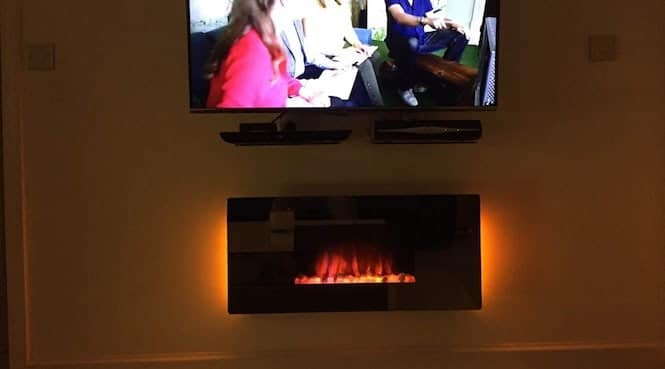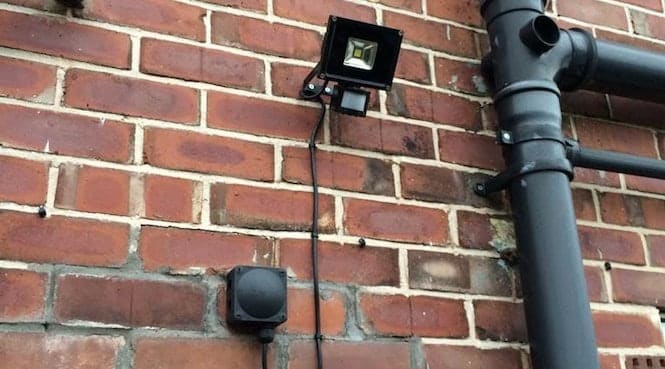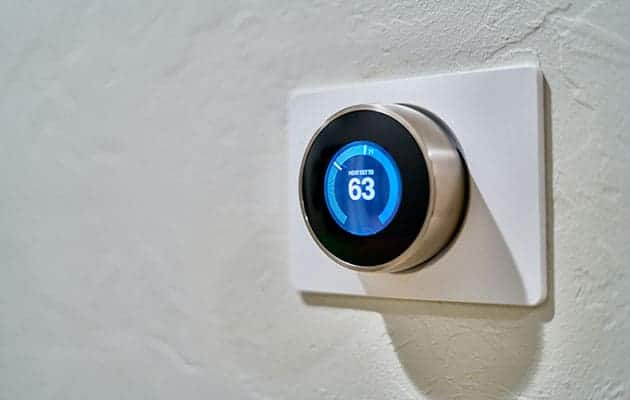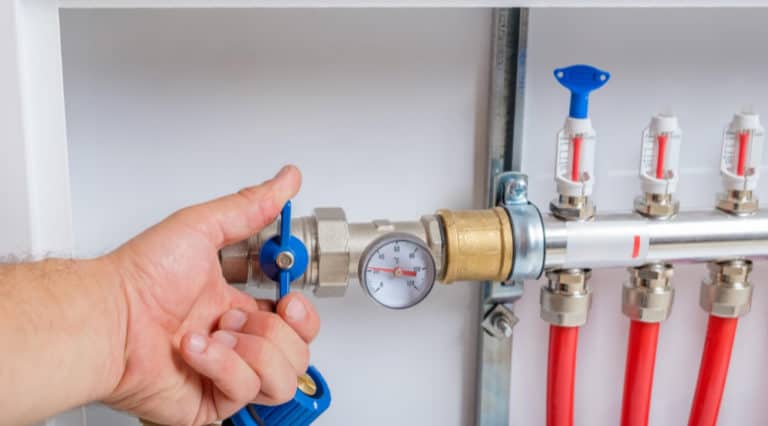Find My Local Expert Electric Wall Heater Installation Considerations Many...
Read More
Free Storage Heaters for UK Pensioners
There is no getting around the fact that electricity is exactly the most efficient way to heat your home, which makes sense considering that a large portion of our electricity is generated from some form of heat conversion. Converting heat energy to electricity only to convert it back to heat is always going to be inefficient. And, with inefficient heating methods comes higher costs, which is no fun for anybody.
Unfortunately, there are times when alternative methods of heating a home are not an option. Perhaps a central heating conversion is out of the price range of the owner. Or maybe the property isn’t on the gas grid, and conventional central heating isn’t an option regardless of cost.
While electricity isn’t the most cost-effective way to heat a home, some homeowners are stuck with it, but that doesn’t mean they can’t look to get the most cost-effective version of electric heating, which is where storage heaters come in.
We’ll get into the details of how these heaters work and why they are more cost-effective than a regular electrical heater below, but suffice it to say that a storage heater is designed—and mostly succeeds—at being a more cost-effective way to heat a home or business, but only compared to other electric heaters. If your property is on the gas grid, the best option for heating it from a price-perspective will be a gas solution.
What is the ECO Scheme?
The ECO (Energy Company Obligation) scheme is an initiative by the government to help reduce the country’s carbon emissions, as well as reduce fuel poverty. The scheme aims to promote measures that will make it easier for vulnerable, fuel poor, and low income households to keep their homes heated.
The scheme works in a number of ways, with the two primary tools being the creation of obligations for energy suppliers to meet certain targets, and the creation of grants to help those who need it.
Included in those grants is a provision for the replacement of faulty or inefficient storage heaters.
Of course, it would serve the goals of the ECO scheme better to move people away from electrical heating altogether, but that is not possible in a practical way for many homes, and so the installation of more efficient storage heaters allows them to at least move in the right direction.
The installation of modern storage heaters can result in as much as a 30% increase in efficiency over older storage heaters, and even more of an improvement if the existing storage heaters are faulty, outdated, or they are a different style of electric heater altogether.
Offering grants for replacement storage heaters helps the ECO scheme achieve both of its main goals—it helps to reduce the nation’s carbon emissions by reducing energy usage, and it helps to keep the utility bills down for those who are vulnerable, low income, or fuel poor.
What is a Storage Heater?
A storage heater—sometimes also referred to as a night heater—is a type of heater that was developed in the mid-to-late twentieth century in an effort to make efficient use of electricity to heat homes. The concept is simple enough; electricity would be charged at different rates, and peak time was when the most electricity was being used, and so the rates would be more expensive. On the other hand, nuclear power plants don’t just stop generating electricity at night when everyone is in bed, so electricity used at off-peak times would be cheaper.
The storage heater takes advantage of this by storing the heat it generates, hence the name. It uses electricity to heat up a core element—such as ceramic bricks—overnight. This core element retains the heat energy, which is then released throughout the day. In this manner, you get the benefit of off-peak electricity rates, even though you are using the heater through the day.
Storage heaters can come with a variety of features, such as boost settings to pump out additional heat at the expense of using daytime electricity rates. Others incorporate fans to more evenly distribute the heat around the given space.
A degree of control can be exercised over when and how a storage heater puts out the heat it has stored, but it should be noted that there is no such thing as perfect storage when it comes to heat. In other words; once a storage heater has stored its heat, that heat is coming back out. The degree to which this happens will largely depend on the type of heater, but for some of the most basic and inexpensive models, it can often be the case that, once heat is stored overnight, it is released over the course of the next day whether you want it or not.
Pros and Cons of an Electric Storage Heater
While there are many people for whom a move away from electric storage heaters is not as feasible, there are others for whom it is within reach, but perhaps not easily so. If you could move to an alternative heating system but are unsure if it is worth the time and money it might involve, here are the pros and cons of electric storage heaters to help you decide.
Pros
- Storage heaters are typically very quiet, often silent if they do not use a fan, but even models with fans are quiet.
- Unlike gas-based central heating systems, there is no plumbing required for storage heater installation, which makes installation easier and provides far more flexibility regarding the placement of the individual heaters.
- They are cheaper to run than other types of electric heaters that do not store the energy they use.
- Storage heaters do have some degree of control over the rate of heat release, and even come with thermostats which allow them to only release heat when needed.
- Storage heaters do not carry a risk of carbon monoxide poisoning, which is one less safety concern to worry about in the home.
Cons
Inexpensive basic models have less control over the heat output of the heater, and may release excess heat which in turn leads to overheated rooms.
The majority of the heat stored in a storage heater is often fully released by the evening, which, unfortunately, is typically the time when it is needed most.
Gas is still notably cheaper than electricity when it comes to heating, so storage heaters are only a cost-effective solution when compared to other types of electric heater.
Areas Covered by the Storage Heater Grant Scheme
The Storage Heater grant scheme covers most of the United Kingdom, with grants being available in Scotland, England, and Wales. The exception, of course, is Northern Ireland. This is because Northern Ireland has a separate scheme in place.
Grants are not available across all of Scotland, England, and Wales, however. For example, homes that are on the gas grid will not be eligible. Similarly, you must own and live in the property you are applying for a grant for. If in doubt, it is always worth contacting your electricity provider, as they should be able to give you more information specific to your circumstances.
This means that householders in these areas are most likely rely on electric heating systems to heat their homes. If you have broken electric panel heaters and receive State Benefits you may qualify for a Storage Heater Grant to help replace them.
Check your area here: https://www.nongasmap.org.uk/
Why Apply for the Grant?
The main reason to apply for this grand is if you are currently limited to electric heating—such as if your home is not on the gas grid—and you do not have the means to upgrade your heating system without assistance.
The grant not only helps you to lower your heating costs and potentially get more effective heating, it also helps the country move towards its goals for reduced carbon emissions which, as we’re sure you’re aware, are goals that benefit the whole planet, not just this country.
How do I Apply For the Storage Heater Grant?
There are several organisations who are prepared to assist you in applying for a storage heater grant. In order to be eligible, you need to fulfil all three of the following criteria;
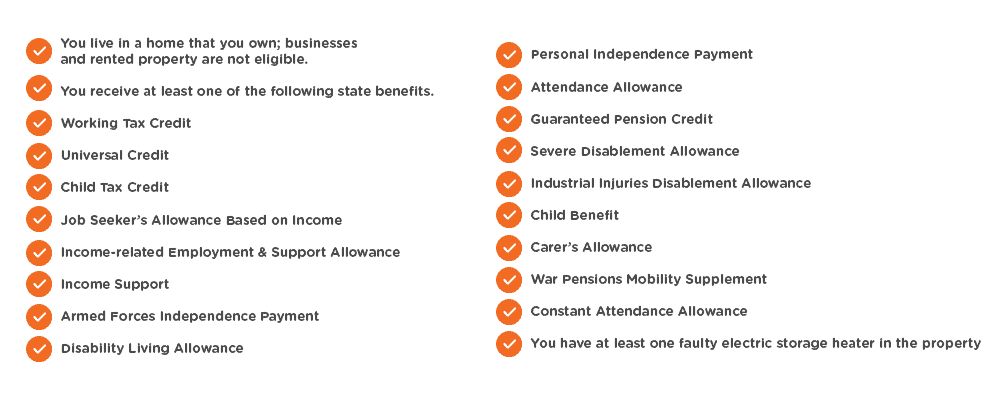
Conclusion
As we mentioned at the top of the post, there is no avoiding the reality that electricity is not the most ideal way to heat a property from a cost-effectiveness standpoint. And, even though storage heaters are far more efficient than other types of electric heater, they are still a poor choice if gas is an option.
However, for homes where gas is not an option, electric storage heaters represent the most cost-effective way to heat your home using electricity, so for those who are eligible for a storage heater grant, it is in your best interests to apply for one.
You May Also Like...
Security Lighting and CCTV System Installations
Find My Local Expert Security Lighting and CCTV System Installations...
Read MoreHow to Spot a Leaking Roof Like a Pro
Find My Local Expert How to Spot a Leaking Roof...
Read MoreIs Your Heater Energy-Efficient?
Find My Local Expert Is your Heater Energy-Efficient? Most people...
Read MoreBoiler Losing Pressure: Here’s how to fix it!
Find My Local Expert Boiler Losing Pressure? Here’s How to...
Read MoreWarm up your household today!
My Trusted Expert Guarantee
Experts Have Been Vetted & Approved
